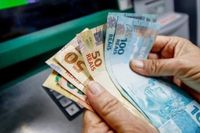On Thursday, April 3, 2025, President Luiz Inácio Lula da Silva signed a decree that anticipates the thirteenth salary for retirees and pensioners of the National Institute of Social Security (INSS). This announcement was made during the "O Brasil dando a volta por cima" ceremony, which celebrated the two-year anniversary of his administration.
The first installment of the advance will be disbursed between April 24 and May 8, 2025, while the second installment is scheduled for May 26 to June 6, 2025. According to the Ministry of Social Security, this initiative will inject a staggering R$ 73.3 billion into the economy, benefiting approximately 34.2 million people.
During the ceremony held in Brasília, Lula highlighted various social programs, including Minha Casa Minha Vida, Pé-de-Meia, and the Student Financing Fund (Fies), alongside initiatives aimed at increasing the minimum wage and promoting infrastructure projects under the Growth Acceleration Program (PAC).
This marks the sixth consecutive year that INSS beneficiaries will receive their thirteenth salary before the traditional payment dates of August and December. Notably, the early payments in 2020 and 2021 were a direct response to the economic challenges posed by the COVID-19 pandemic. In subsequent years, 2022 and 2023, the payments were made in May and June, while in 2024, they were again advanced to April and May.
For those earning up to the minimum wage, the payment schedule is as follows: the first installment will be credited on April 24 for those whose Social Security Number (NIS) ends in 1, with subsequent payments staggered by the last digit of the NIS. For example, beneficiaries with NIS ending in 2 will receive their first payment on April 25, while those with NIS ending in 3 will receive theirs on April 28.
For recipients earning above the minimum wage, the first installment will be credited from May 2 for those whose NIS ends in 1 and 6, and will continue through May 8 for those with NIS ending in 0. The second installment for these individuals will follow a similar schedule from June 2 to June 6.
The Ministry of Social Security has made it clear that those who earn only the minimum wage will receive their payments earlier than those with higher earnings. This is in line with the government's commitment to prioritize the most vulnerable populations during these economic times.
For individuals looking to check their payment status, the process has been made accessible through the Meu INSS app, available on mobile devices, or via the INSS website. Those without internet access can call the helpline at 135 for assistance. This service operates from Monday to Saturday, between 7 AM and 10 PM, and requires users to provide their CPF and answer security questions.
As the government continues to navigate economic recovery, this measure is seen as a positive step towards restoring the president's popularity and addressing the needs of millions of Brazilians who rely on these payments.
According to the most recent data from February 2025, approximately 28.68 million individuals, or about 70.5% of all INSS beneficiaries, earn up to the minimum wage of R$ 1,518 per month. In contrast, 11.98 million beneficiaries receive amounts above this threshold, with 10,600 individuals earning the maximum Social Security benefit of R$ 8,157.41.
This advance in the thirteenth salary is not just a financial relief for many; it also serves as a critical economic stimulus at a time when many sectors are still recovering from the impacts of the pandemic. The government hopes that this influx of cash will help spur consumer spending and further economic growth.
In summary, the anticipation of the thirteenth salary for retirees and pensioners of the INSS is a significant move by the Brazilian government, designed not only to support those in need but also to invigorate the economy as a whole. With millions set to benefit, the initiative reflects a commitment to social welfare and economic revitalization during challenging times.








